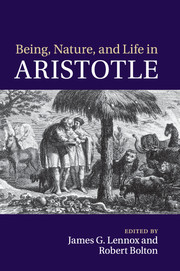Book contents
- Frontmatter
- Contents
- Preface
- Notes on contributors
- Acknowledgments
- Allan Gotthelf: a biographical sketch
- Note on abbreviations
- Introduction
- 1 Teleology, Aristotelian and Platonic
- 2 Biology and metaphysics in Aristotle
- 3 The unity and purpose of On the Parts of Animals 1
- 4 An Aristotelian puzzle about definition: Metaphysics Ζ.12
- 5 Unity of definition in Metaphysics Η.6 and Ζ.12
- 6 Definition in Aristotle's Posterior Analytics
- 7 Male and female in Aristotle's Generation of Animals
- 8 Metaphysics Θ.7 and 8: Some issues concerning actuality and potentiality
- 9 Where is the activity?
- 10 Political community and the highest good
- Allan Gotthelf's contributions to classical philosophy
- References
- Index locorum
- General index
2 - Biology and metaphysics in Aristotle
Published online by Cambridge University Press: 06 December 2010
- Frontmatter
- Contents
- Preface
- Notes on contributors
- Acknowledgments
- Allan Gotthelf: a biographical sketch
- Note on abbreviations
- Introduction
- 1 Teleology, Aristotelian and Platonic
- 2 Biology and metaphysics in Aristotle
- 3 The unity and purpose of On the Parts of Animals 1
- 4 An Aristotelian puzzle about definition: Metaphysics Ζ.12
- 5 Unity of definition in Metaphysics Η.6 and Ζ.12
- 6 Definition in Aristotle's Posterior Analytics
- 7 Male and female in Aristotle's Generation of Animals
- 8 Metaphysics Θ.7 and 8: Some issues concerning actuality and potentiality
- 9 Where is the activity?
- 10 Political community and the highest good
- Allan Gotthelf's contributions to classical philosophy
- References
- Index locorum
- General index
Summary
THE AUTONOMY OF THE SCIENCES IN ARISTOTLE
Biology, for Aristotle, is an autonomous theoretical science. Or rather, to be more precise, biology is a proper part of physics or natural science (phusikē), which is itself wholly autonomous and separate from the other theoretical sciences. This means not only that biology is autonomous and separate from each of the mathematical sciences such as geometry or astronomy or optics. It is also autonomous and separate from the primary theoretical science, namely theology. Since, for Aristotle, the study of what is qua being, or general metaphysics, is either identical with or belongs exclusively to the same science as theology, it follows that biology is separate from and autonomous with respect to metaphysics in general. Since this relation of autonomy and separateness is symmetrical, if biology is separate from and autonomous with respect to metaphysics, for Aristotle, then metaphysics is equally autonomous and separate from biology.
Now one might think that these things are, or should be, quite uncontroversial, and hardly in need of saying, since Aristotle sets them out very plainly himself both in the Posterior Analytics and in Metaphysics Γ and Ε. According to APo. 1.10 there are just three types of ingredients that make up each science. As Aristotle says:
Each demonstrative science restricts its concern to three things: (1) the entities whose existence it posits (tithetai) which fix the kind (genos) whose proper attributes it is its job to study; also (2) the so-called common axioms which are a primary basis for demonstrations; and thirdly the [proper] attributes [of the genos], of which it grasps what each signifies. […]
- Type
- Chapter
- Information
- Being, Nature, and Life in AristotleEssays in Honor of Allan Gotthelf, pp. 30 - 55Publisher: Cambridge University PressPrint publication year: 2010
- 2
- Cited by



